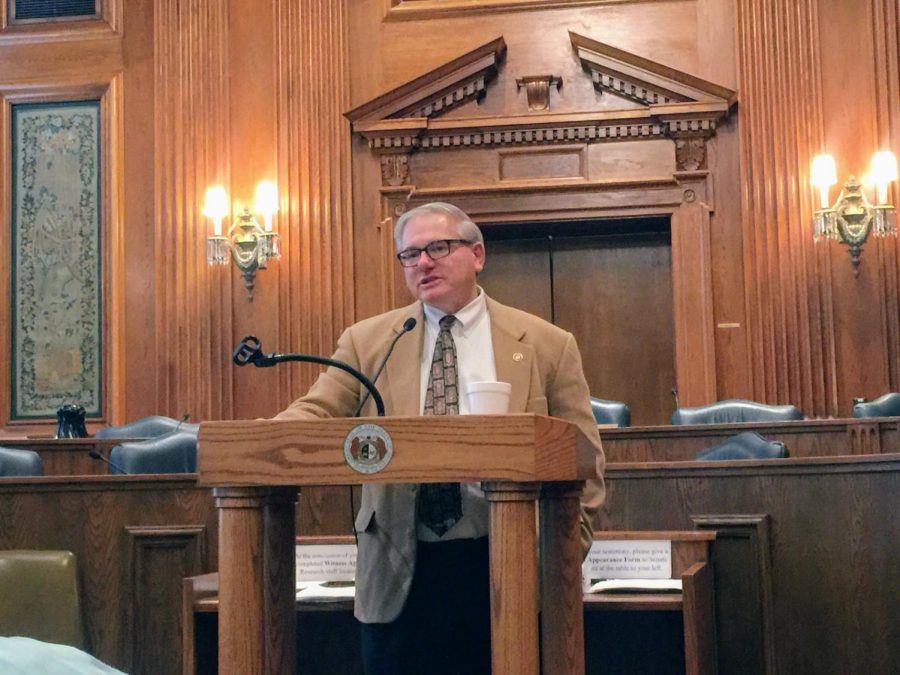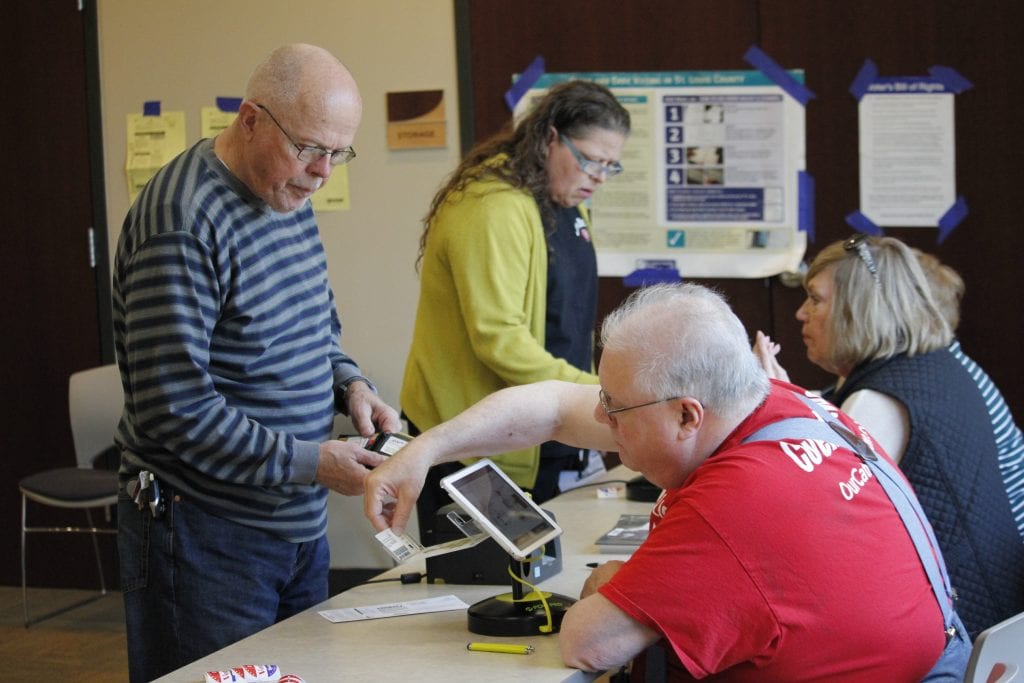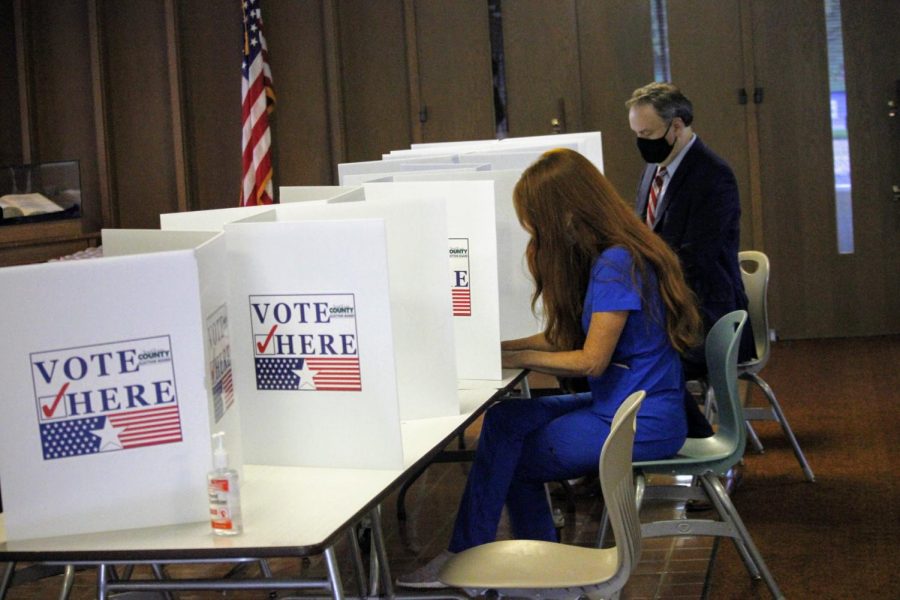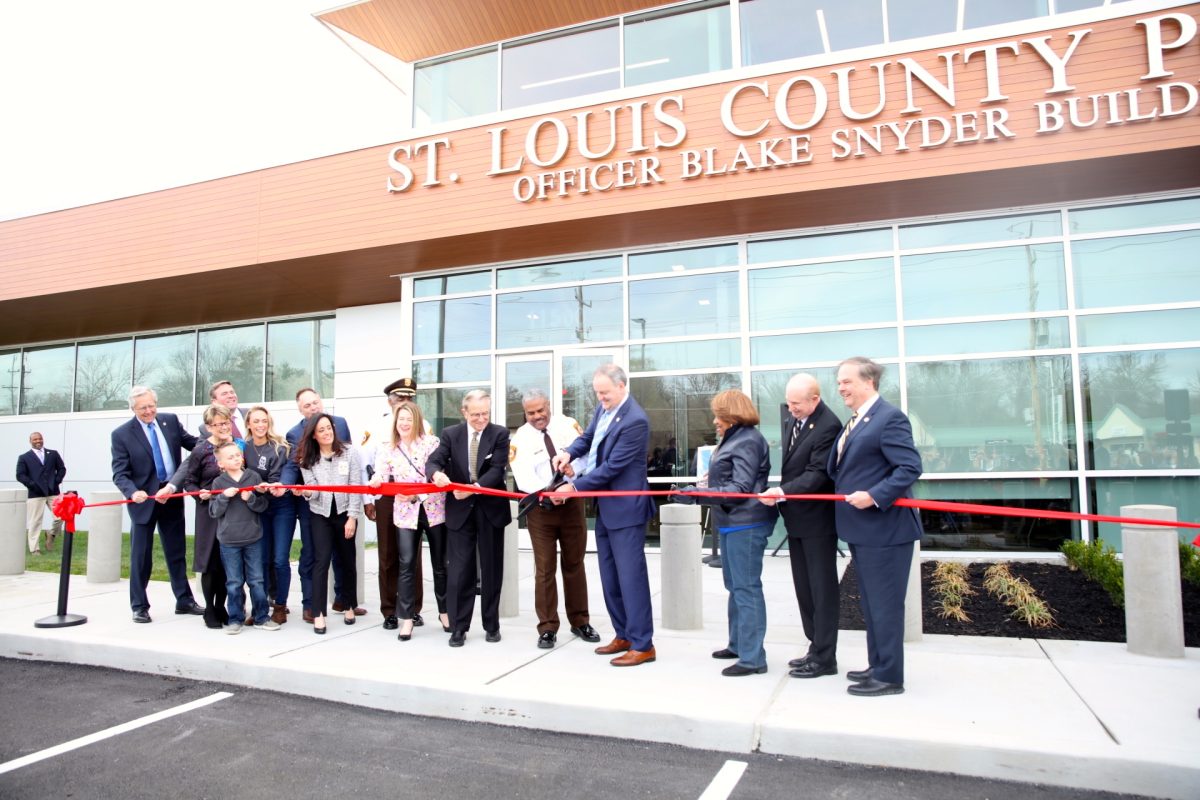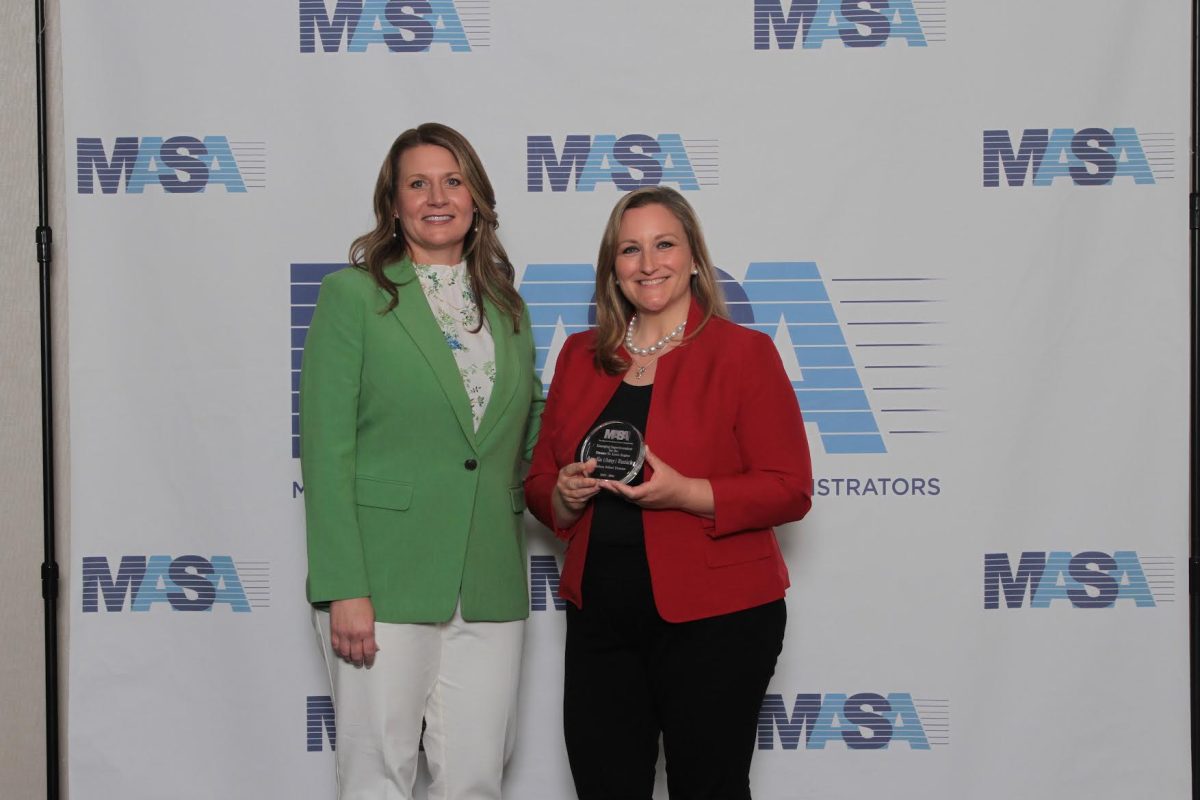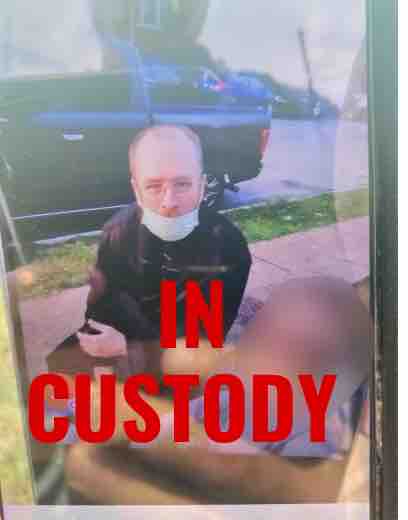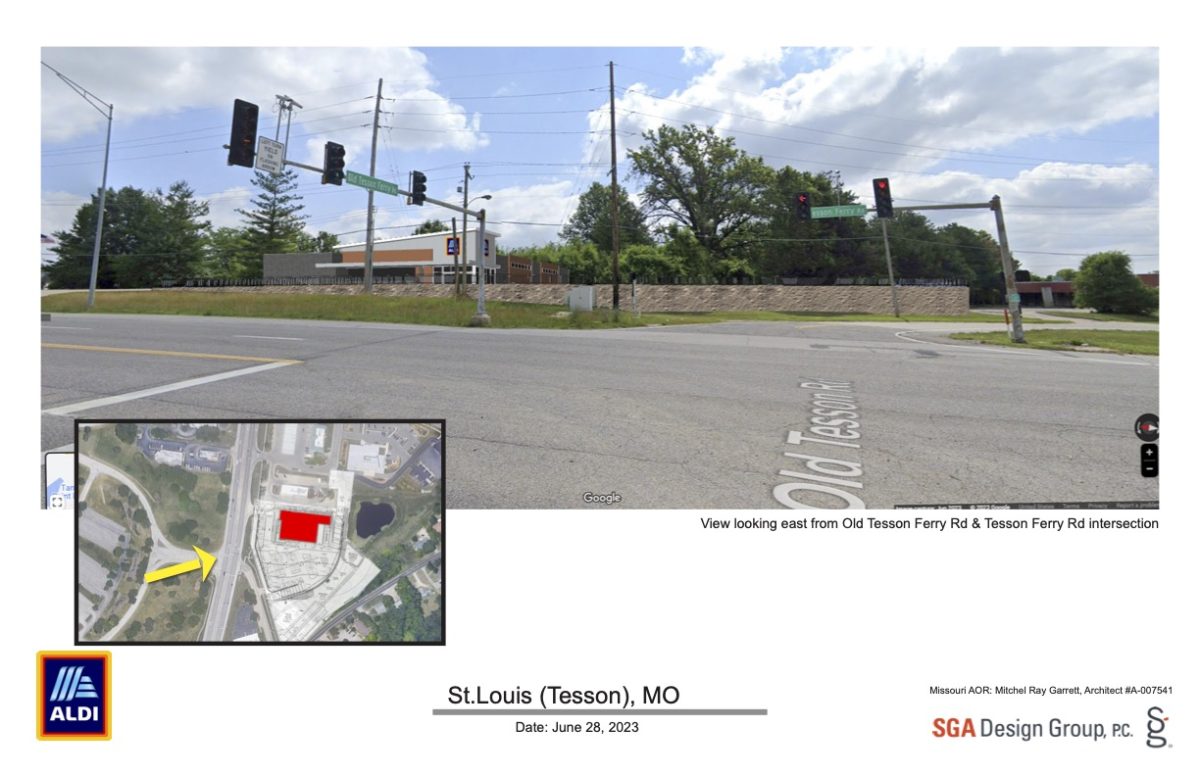Voters will consider two amendments to the Missouri Constitution in the election Tuesday, Nov. 3, highlighted by Amendment 3, a partial rerun of the Clean Missouri amendment approved by voters in November 2018 that has been dubbed “Cleaner Missouri” by its backers and “Dirty Missouri” by its opponents.
If approved, the amendment placed on the ballot by the Republican-led Legislature would retract a revamp of the longstanding redistricting process that Missouri voters overwhelmingly approved as part of Clean Missouri, a citizen-backed petition on the ballot in November 2018 that also instituted ethics reforms like lobbyist gift limits. As a whole, Missourians voted 62 percent in favor.
Clean Missouri supporters are opposing Amendment 3 with an even broader coalition this time around because they believe voters already made their opinions known ahead of this new amendment, which they allege would increase gerrymandering with changes that no other state has such as not counting children or immigrants when drawing maps. Those in favor of a second referendum believe voters didn’t understand what they were approving in 2018.
The proposed changes to Clean Missouri include:
· Eliminating the role of a “nonpartisan state demographer” and reverting to a redistricting system where the lines are drawn by bipartisan commissions appointed by the governor, but making some changes to that process.
· Changing the lobbyist gift threshold from $5 to zero.
· Reducing the limit on contributions given to or received by candidates.
Clean Missouri changed the state’s method of redistricting from commissions of political appointees from both sides of the aisle to a nonpartisan state demographer, a move that supporters believe would make elections more competitive and more reflective of the state as a whole. An AP analysis in 2017 showed that Missouri Republicans in the Legislature win seats at higher levels than their overall representation among the voting population.
The bill to place the rollback of Clean Missouri on the ballot was sponsored by Sen. Dan Hegeman, R-Cosby, who represents the most rural Senate district in Missouri, the 12th District spanning 15 northwest counties.
The senator said he spearheaded the decision to go back to voters because he wants to protect both rural and urban communities and cultures by overturning the untested redistricting process approved in Clean Missouri before it is used next year to redistrict based on the 2020 census. If voters approve Amendment 3, Hegeman promised on the Senate floor that they would simply be returning “back to a civil process that we have used time and time again I would argue for many decades,” which has at various times resulted in legislative majorities for both Democrats and Republicans.
But opponents of the amendment from both sides of the aisle contend that if you read between its lines (read the full text here), the amendment radically changes redistricting and doesn’t simply return to the process on the books since 1885. Former U.S. Sen. Jack Danforth, a Republican, called Amendment 3 a “redistricting scheme more extreme than Missouri has ever seen.”
Even the League of Women Voters, which typically doesn’t take sides on issues, is opposing Amendment 3 because the group believes it would return to redistricting that is more partisan and less fair than the Clean Missouri version.
“While Amendment 3 makes minor tweaks to lobbyist gifts and campaign contributions, it is about replacing fair maps with rules that would allow extreme gerrymandering. If it’s passed, Missouri could have the worst political gerrymandering in the country,” said League of Women Voters of Metro St. Louis Co-President Nancy Miller, adding, “I’ve read every part of this bill — the Legislature rushed to pass it, it is full of flaws, with very little debate on it” since it makes it more likely the GOP Legislature will retain a veto-proof majority. The League of Women Voters’ Angie Dunlap, a South County resident, testified against the amendment in the Legislature.
Under Clean Missouri the nonpartisan demographer, who has not yet been appointed for this upcoming redistricting process, applies through the state auditor’s office and the top applications are forwarded to the majority and minority leaders of the Missouri Senate to decide who to hire. The demographer draws the map and sends it to the bipartisan commission, which can reject the maps by a seven-tenths majority. The data behind the maps would be released publicly, which backers say is a win for transparency because anyone could easily challenge the maps if the data shows they are unfairly drawn.
Under the bipartisan commission process that has historically existed and would return again with the approval of Amendment 3, two governor-appointed commissions comprised of half Democrats and half Republicans — one for the Senate, one for the House — would draw maps. Both commissions increase to 20 members under the plan, up from 18 and 10. No members can be elected officials. If the process goes the way it has in the past, the data behind the maps would not be publicly released.
“This bipartisan commission actually returns that power back to the people here in the state of Missouri,” said Sen. Denny Hoskins, R-Warrensburg, on the Senate floor. He tells constituents who voted in 2018, “If you liked Clean Missouri, you’re going to love Cleaner Missouri.”
Does amendment increase or decrease gerrymandering?
Both sides say their preferred version of redistricting will decrease gerrymandering and the other side will increase it. Anti-gerrymandering groups see the 2018 Clean Missouri changes as a step forward, but Missouri Republicans see it as a step backward. Hegeman said on the floor of the Senate Jan. 31 that the new redistricting would be a “monumental change that could have ramifications for years, if not generations” and could result in the notoriously “long, spindly districts” of gerrymandering coming to his district or others across Missouri. That prospect justifies sending the issue back to voters for a rerun, he said.
The communications director for Clean Missouri, Sean Soendker Nicholson, said at an Oct. 13 Drury University forum on Amendment 3 that the change would create the “most rigged maps in the United States, unlike anything any other state is doing, unlike anything in the United States. Groups that fight gerrymandering, every single one of them says Amendment 3 is an extreme radical plan that ought to be defeated.”
Under the criteria reinstated by Amendment 3, the priority would be to draw districts as “compact and contiguous as possible,” keeping cities, communities and natural boundaries together. Hegeman decries the language in Clean Missouri that the nonpartisan map has to prioritize “partisan fairness” and “competitiveness” over keeping districts “compact and contiguous.”
That could eliminate wasted votes, in which voters of one party are intentionally packed into a district that has a majority for the other party to maximize legislative seats that go to that party. But it might also result in more Democrats getting elected to office in the state: Republicans won 57 percent of overall votes for the Legislature statewide, but took 71 percent of the seats, according to the AP analysis.
Ahead of the passage of Clean Missouri in 2018, Sam Wang, a scientist who studies gerrymandering at Princeton University, posted in a series of tweets that after researching the Clean Missouri proposal, he and his team found that one-fifth of seats would have to be competitive under the change, but the rest of the seats would be more solidly Republican or Democratic. Wang concluded that the dominant party, Republicans, would gain seats under the proposal: “This can all be done without drawing crazy shapes. All in all, it makes government more responsive without necessarily distorting the geography or partisan tendencies of Missouri. Easy to see why Amendment 1 (Clean Missouri) got bipartisan support.”
At the Drury forum, Hegeman said the Clean Missouri process “puts Missouri way out on a limb with this experimental plan, that’s why I’m offering the opportunity to go back to a tried and true process that honors our county boundaries, that honors our communities as a higher priority than an effort to achieve partisan fairness and partisan goals.”
Rep. Michael O’Donnell, R-Oakville, identified Amendment 3 as one of his top priorities in a town hall in South County last year. In a response this fall to The Call’s candidate questionnaire for his re-election race Nov. 3, he took it a step further and said that Oakville could lose its local representation under the new system.
“Right now, Oakville has someone in the Missouri House of Representatives that is an Oakville resident who is looking out for Oakville interests,” O’Donnell said. “If Amendment 3 doesn’t pass, many residents in Oakville could find their representative lives in the city of St. Louis, Lemay or Webster Groves. Oakville deserves Oakville representation in the Missouri House.”
To see what other South County legislators and their opponents said about the amendment, see the end of this article.
Will the new maps count children?
Civil-rights groups across the board, including the St. Louis County and Missouri NAACP and the ACLU, are opposing Amendment 3 because they believe it will enshrine a more discriminatory form of redistricting into the Constitution, including the idea of “one person, one vote,” which they say means that children, immigrants and felons will not be counted since they cannot vote.
But Hegeman said at the Drury forum that claim is a “misrepresentation of what the amendment says. There’s nothing in Amendment 3 that says kids will not be counted.”
St. Louis County mayors and County Executive Sam Page have spoken against Amendment 3, saying it will cost local governments federal tax money since it will undercount the population by eliminating children. Although Hegeman disputes that is the intention behind the amendment, at the forum Nicholson quoted Hegeman’s comments on the Senate floor from January that the intention of the “one person, one vote” language is to count eligible voters, a position backed by the Missouri attorney general’s office during court cases on whether the ballot language was misleading.
“They are trying not to count kids in our maps,” said Nicholson.
Democratic lawmakers believe amendment ignores will of voters
Only one Senate Republican, Sen. Lincoln Hough of Springfield, joined Democrats in voting against Hegeman’s bill, which passed the Senate 22-9.
Sen. Scott Sifton, D-Affton, voiced his opposition to the bill when it was debated in the Senate in January, joining Sen. Jill Schupp, D-Creve Coeur, in saying that he didn’t want their “no” votes to be viewed as support for lobbyist gifts.
Sifton said that while he understands the desire to eliminate lobbyist gifts — something he’s never accepted in the Legislature, unlike many of the legislators who voted for Amendment 3 — he also doesn’t want to dismiss what voters already determined in 2018.
“The collective wisdom of the 182,000 people that I represent dwarfs the wisdom of every senator who has ever served in this chamber,” Sifton said, adding, “The suggestion that voters aren’t paying attention and that they’re on cruise control and autopilot and not looking at these things, I think it’s preposterous.”
Schupp, who is running for Congress against U.S. Rep. Ann Wagner, R-Ballwin, opposed the bill, saying that she was confused at Republicans’ claim that voters were confused with the amendment when the proposed changes would put it before them in much the same way as it was in 2018.
“People want a fair shake, they want their vote to count, they want to get rid of the partisan gerrymandering in the drawing of districts and I think they were very clear in supporting … a nonpartisan demographer who would draw those lines seeking, where possible, partisan fairness in how maps were drawn,” Schupp said.
What South County legislators are saying
South County’s legislators are split by party on the amendment, with Republicans supporting it and Democrats opposing it.
Here’s what they said in response to the question: Do you support the changes to “Clean Missouri” that are on the ballot as Amendment 3?
Sen. Andrew Koenig, a Republican from Manchester: “It was never ‘Clean Missouri,’ it was a campaign intended to create a partisan redistricting process under the guise of lobbyist and campaign finance reform. Those were just table dressing for what was really underneath and I welcome the opportunity for voters to express their thoughts on the redistricting process which I believe should be handled by a bi-partisan commission instead of a single elected official.”
Rep. Jim Murphy, R-Oakville: “Clean Missouri changed the criteria for establishing House and Senate districts. Clean Missouri changed the standard from: ‘Districts must consist of contiguous territory as compact as may be and to the extent permitted communities must be preserved.’ These criteria were in place so that community values could be preserved and that community interests would be represented. When Clean Missouri was passed, the standard was changed to create politically competitive districts that no longer need to be compact or contiguous. Therefore, in order to make an inner-city or North County district more Republican, it can be split to include parts of South County. Under Clean Missouri, the state representative from the 94th district could be from North County or St. Louis city. I do not believe this serves this district well, as the issues concerning Oakville and Mehlville are very different from those areas. I believe that representatives should reflect the community that they live in, regardless of political party. I will support Amendment 3.”
Challenger Jean Pretto, Democrat from Oakville: “Absolutely not. This is a slap in the face of Missouri voters who already approved the original by a large margin.”
Rep. Michael O’Donnell, a Republican from Oakville: “I do support them. Reducing the influence of special interest groups through the reduction of maximum contributions is something we can all get behind. Also, right now, Oakville has someone in the Missouri House of Representatives that is an Oakville resident who is looking out for Oakville interests. If Amendment 3 doesn’t pass, many residents in Oakville could find their representative lives in the city of St. Louis, Lemay or Webster Groves. Oakville deserves Oakville representation in the Missouri House.”
Challenger Ann Zimpfer, a Democrat from Oakville: “No, these changes are not necessary. Nearly 60 percent of voters in the 95th District voted for Amendment 1 in 2018, and this new amendment disrespects these educated voters. Amendment 3 will undo voter support for fair maps and fair redistricting, and would make Missouri the first state in the country that does not count children and non-citizens when drawing new districts.”
Rep. David Gregory, R-Sunset Hills: “Clean Missouri changed the criteria for the legislative district so as to decrease the importance of our community values and increase the importance of a ‘competitive’ district. Our community values are extremely important. We should not be forced to vote in districts that are ‘competitive.’ Rather, we should be allowed to vote based on the values with which our parents raised us and our community supports.”
Challenger Erica Hoffman, a Democrat from Fenton: “I absolutely do not support the changes. Missouri voters overwhelmingly approved ‘Clean Missouri’ in 2018. Amendment 3, ‘Dirty Missouri,’ is a product of our Legislature trying to undo the will of the people for their own financial gain.”
97th District
Mary Elizabeth Coleman, R-Arnold, is unopposed for re-election. She said at the time the House passed the legislation, “I don’t think that asking them to make a change, if they are interested in doing so, or to not make a change from what they just enacted, is in any way disrespectful.”
No incumbents are running in the 1st Senate District and the 92nd and 93rd House districts. Here’s what those candidates said.
Rep. Doug Beck, D-Affton: “No. I support what voters passed in 2018. This is simply an attempt by the Republican politicians to pick their voters instead of the voters picking legislators.”
David Lenihan, Republican from Oakville: “Yes. I would like to see more transparency in the contributions to an individual candidate to Political Action Committees providing a line to who is providing the monies. For instance, my opponent is accepting $100,000’s campaign donations and funneling the monies through a PAC violating the voter’s intent of Clean Missouri. I also support a total lobbying gift ban as provided in Amendment 3.”
92nd District
(see incumbent Beck’s answer above)
Michael Burton, a Democrat from Lakeshire: “No.”
Heisse, a Republican from Affton: “As with any legislation put to a statewide vote, I’m not going to support overturning the will of the voters. While I was not a proponent of ‘Clean Missouri,’ I respect that the majority of citizens in our state favored this proposal and I will not subvert the will of the electorate.”
93rd District
Gabriel Jones, a Republican from Affton: “‘Clean Missouri’ was an ill-conceived proposal from the beginning. Rather than address the root causes of the perceived corruption in Jefferson City, which are an entrenched two-party system and term limits that are too short, so-called ‘Clean Missouri’ changed the existing criteria for drawing state legislative districts. The old rules emphasized the time-tested criteria of compact and contiguous districts, but the new rules prioritize partisan fairness. This will result in even worse gerrymandering, less responsive elected representatives and will further entrench the two-party system.”
Bridget Walsh Moore, a Democrat from Affton: “I do not. Voters already passed historic ethics reform in 2018. Amendment 3 is an attempt by career politicians to protect their lobbyist friends and trick voters into weakening Missouri’s ethics laws. I’m encouraging everyone I know to vote no on Amendment 3 in November.”


















